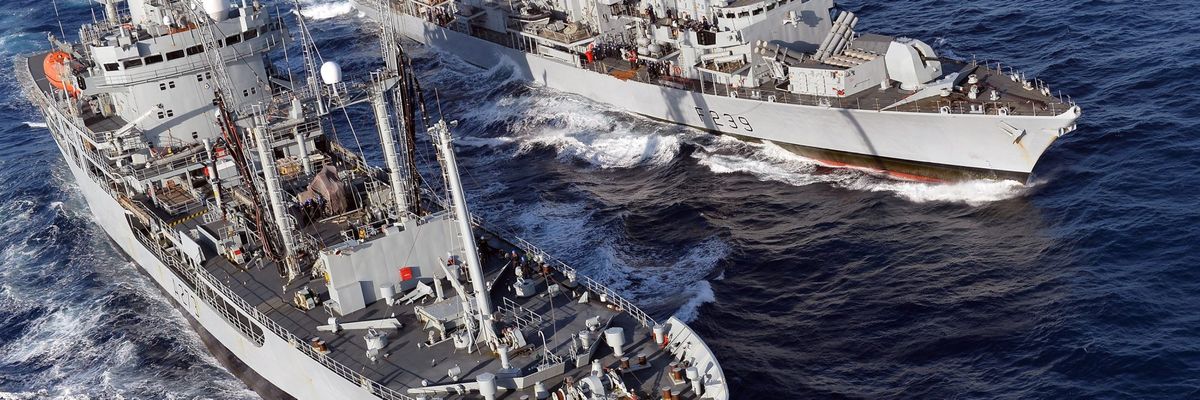In an unprecedented late-night statement that did not follow any known protocol, the UK’s foreign secretary accused Russia of plotting to topple the Ukrainian government and replace it with a puppet regime. As the Financial Times reported, the “...UK’s late-night statement came at the end of a day when Germany’s naval chief resigned after sparking a diplomatic row by saying that Vladimir Putin should be given the ‘respect he probably deserves’ and claiming that Crimea would never be returned to Ukraine."
Meanwhile, Britain has been, somewhat unusually, at the forefront of providing weapons and platforms to Ukraine, often bypassing German and Dutch airspace. “A senior British official said that [avoiding German airspace] reflected Britain’s close consultations with Denmark and Sweden and that London did not ask the Germans for permission because it would have delayed a mission that depended on speed.” reported the New York Times.
The German, and by logical alignment, the Dutch and Italian position on Ukraine, has been one of detached concern. Germany’s navy chief had to resign after speaking what everyone knows to be true, that Russian revanchism isn’t just mindless imperialism, but has some merit given their perpetual sense of betrayal and threat; an analysis, incidentally shared by the Italian government and one which caused the Ukrainians to have a public meltdown. The only outlier in Western Europe was Britain. Increasingly it feels like Britain is favoring accelerationism and brinkmanship, with support from East and Central Europe, in contrast to increasingly defensive and uncomfortable Germany, France, and to some extent U.S. To what end is a matter of speculation.
I have often wondered why Britain is so inclined to instinctive anti-Russian balancing in Europe. Process tracing is of course a difficult job, especially in fluid scenarios. But it defies immediate material or geographical logic. Britain is neither now, nor in the near future, directly threatened by Russian tanks rushing through the European low countries, or the Russian navy enjoying overwhelming superiority in the English channel. So, what might be the proximate cause?
Without being privy to the British government’s internal deliberation, there could be three possible explanations. The most plausible explanation is often the simplest as well as the most disturbing one: That the British state’s upper echelons are so cocooned, that they increasingly believe their own internationalist rhetoric. That they are more committed to Ukrainian sovereignty and borders than their own, spending blood and treasure to prop up eastern Europe while failing or refusing to stop human trafficking in the English channel. Committed and bipartisan British liberal-internationalists like Rory Stewart, Tom Tugendhat, and Tobias Ellwood, as well as the current British foreign secretary Liz Truss and Labour leader Sir Keir Starmer dominate foreign policy thinking. This is compounded by a lack of a more restrained voice in the British foreign policy establishment and media, a sad end to a once glorious legacy of narrow Tory realism from Castlereagh to Salisbury, Curzon to Lansdowne and Halifax.
But there might be some other logical reasons. In some ways, a small conflict on the eastern frontiers of the EU would consolidate the British position as a net security provider and offshore balancer in Europe. Consider the broader implications of this accelerationism. More British arms and aid will result in a security dilemma spiral that would compel Russia to counter-escalate, as well as increase the dependence of central and eastern European states on British material support. For as long as there are no British troops in the direct line of fire (and London has already indicated that it is disinclined to put active troops in combat) London can keep playing this game and upping the ante.
Germany has neither the will nor the capability to provide any security in eastern Europe, and France is ideologically opposed to further Anglo-American-hegemony and therefore is positioned against further brinkmanship with Russia. For good or for bad, it appears to central and eastern Europe that France and Germany are not reliable enough to have any further interest in militarily balancing Russia. The secondary and unsaid calculation from the British side might be that given London’s own turbulent relationship with Berlin and Brussels, a better relationship with the Baltics and the Poles will result in a favorable balance in Europe.
Another line of reasoning might be that, for all that’s worth, post-Brexit Britain is yet to find a primary international role that suits its purpose and serves its interest. While public opinion overwhelmingly opposes an EU superstate as well as an EU army, Britain is unable to leave the continent and follow America to Asia, as American retrenchment will automatically propel the Europeans to consolidate their own security architecture.
Not that it needs much effort. Even with American public opinion favoring a partial retrenchment from Europe, the American Atlanticists remain committed to European defense, to the point of advocating for a war with Russia. But London has noted the rise of American retrenchment tendencies and cautious public opinion with some concern, observable in the harsh rhetoric in the UK Parliament post-Afghanistan withdrawal.
In other words, to stop the EU from turning into an independent superstate, “keeping the Americans in, and the Germans down” is, therefore, a renewed strategic purpose in London. All the talk of “liberal internationalism” and rules-based order, with Britain increasingly sounding more Catholic than the Pope, as both the core western EU and the U.S. become detached from the old conflicts of the East, is basically a couched and clever powerplay where tying down America to the European continent serves as a historic British power enhancer. Whether it is sustainable in the long run, is anyone's guess.
















